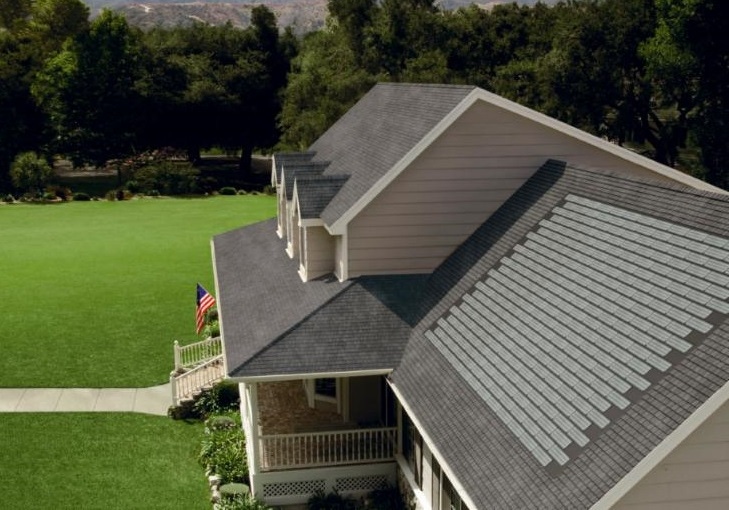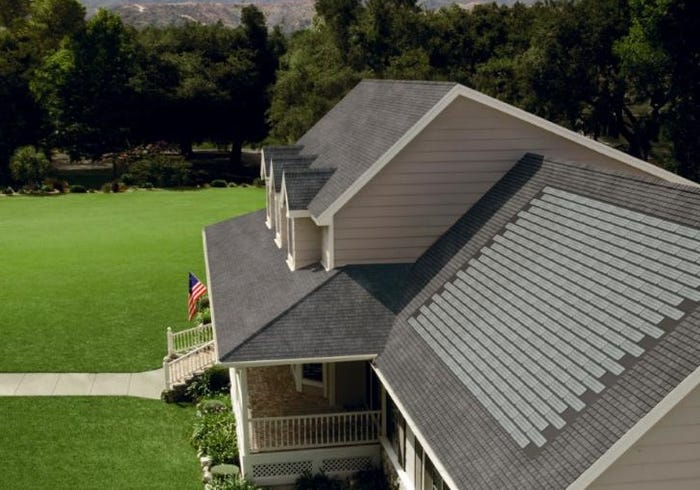Dow Solar Shingles availability expands
Dow is continuing to expand the availability of its Powerhouse Solar Shingles in 2014. Dow Chemical's Dow Solar business this year made the Solar Shingles available for the first time in Florida, New Jersey, and North Carolina. Canadian Energy was named to be its distributor in Canada.The Solar Shingles are designed to be handled and nailed into place much like standard asphalt roof shingles. Unlike standard shingles, these use integrated photovoltaic cells to transform sunlight into electricity that helps power the home.
June 2, 2014

Dow is continuing to expand the availability of its Powerhouse Solar Shingles in 2014. Dow Chemical's Dow Solar business this year made the Solar Shingles available for the first time in Florida, New Jersey, and North Carolina. Canadian Energy was named to be its distributor in Canada.
The Solar Shingles are designed to be handled and nailed into place much like standard asphalt roof shingles. Unlike standard shingles, these use integrated photovoltaic cells to transform sunlight into electricity that helps power the home.

Dow Powerhouse Solar Shingles
Dow uses a CIGS (copper indium gallium diselenide) as a PV (photovoltaic) material. The material was chosen as a more cost-effective and durable option than silicon-based solar cells. It also enables use of thinner, more flexible materials. The PV material is supplied by Global Solar Energy of Tucson, AZ.The CIGS-based PV cells are incorporated into the roofing shingles by over-molding them with a proprietary Dow polymer. The electrical circuitry enabling power-generation is integrated into each shingle, and the shingles are connected by wireless plug-style connectors.
The end product is designed to have a weight and installation method similar to an asphalt shingle. The shingles plug-in connection system means electrical tradesman are not required during the installation of the roof. The shingles are designed to offer the same protection as an asphalt shingle and to blend visually with the standard shingles that make up the rest of the home's roof. The result is a much less obtrusive appearance when compared to the frame-mounted solar panels that have traditionally been used for roof-mounted home PV systems.
Cost-justifying a PV-capable roof can also be easier for the home builder compared to justifying the cost of a PV system in addition to a standard roof.
Dow sells the shingles with a 20-year warranty. It has seven performance and safety certifications, including UL listing and International Code Council Evaluation Service (ICC-ES) certification, and Dow has tested the product to withstand rain, hail, and wind uplift.
The Solar Shingle was developed by Dow as the result of a 2007 grant of $20 million from the U.S. Department of Energy, as part of the DOE Solar America Initiative to develop "building integrated" solar arrays for residential and commercial markets. Dow's Solar Shingle was unveiled in limited production form in October 2009. It received much interest from the media, and was named one of the 50 Best Inventions of 2009 by TIME magazine. The product received UL approval in 2010 and was launched commercially, still in very limited quantities, in October 2011.
Dow's initial production was in a small-scale manufacturing facility near its headquarters in Midland, MI; it then started large-scale manufacturing to accommodate a nationwide rollout. The plant was expected to create as many as 1275 jobs by 2015.
As production has ramped up and Dow expands the distribution across North America, the technology continues stirring high-profile interest. The commercializing of the Powerhouse Shingles garnered Dow Chemical a place on the list of 2013's 50 Disruptive Companies, MIT Technology Review's annual list of the world's most innovative technology companies.
In May 2014, with availability just beginning in parts of the Northeast, Dow profiled the installation of a Solar Shingles roof on a home being built in Fairfield County, NY, by Murphy Brothers Contracting. The 4.5 Kw solar shingle system replaces some 600 sq ft of conventional roofing, and was installed by Murphy Brothers and Matthew Roofing Company. The PV system will supply about half the home's daily electricity usage.
The home is being built for Chris Murphy-who happens to be co-owner and president of Murphy Brothers.
About the Author(s)
You May Also Like


